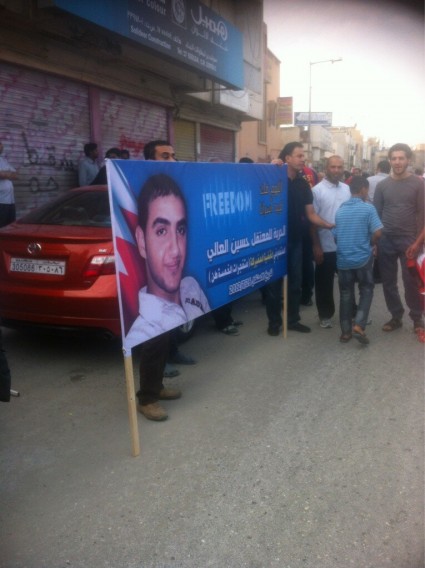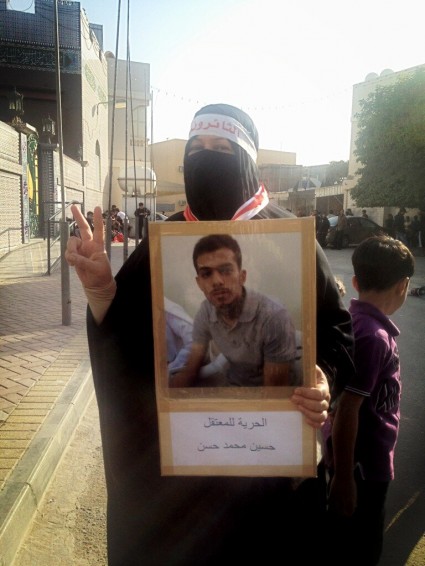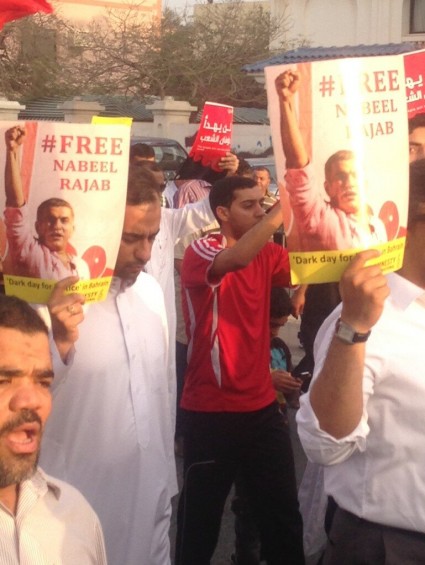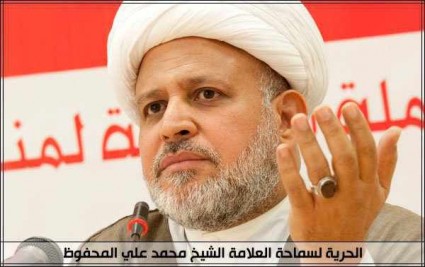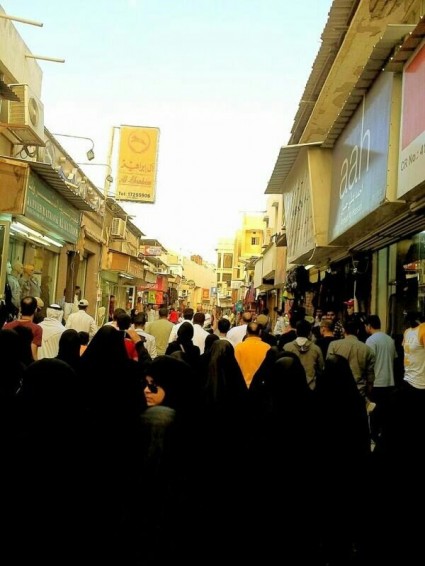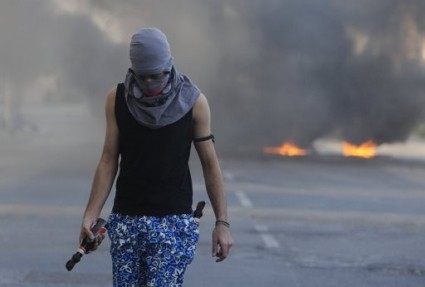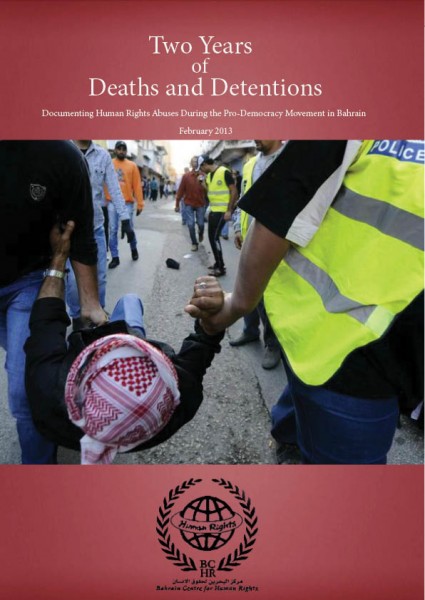Posts from — February 2013
Remembering Karim Fakhrawi as Dialogue with Killers goes ahead
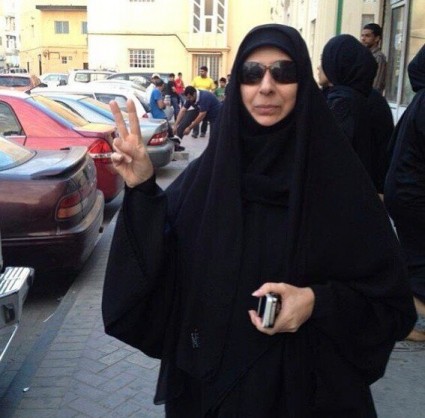
Wife of martyr Kareem Fakhrawi joined the protest in Manama earlier today, 12 February, 2013
Karim Fakhrawi
Al-Wasat -April 12, 2011, in Manama, Bahrain
Fakhrawi, founder and board member of Al-Wasat, the country’s premier independent daily, died in state custody a week after he was detained, according to news reports. Human rights defenders told CPJ that Fakhrawi had gone to a police station on April 5 to complain that authorities were about to bulldoze his house.
Bahrain’s official news agency said on Twitter that Fakhrawi died of kidney failure. Photographs published online, however, showed a body identified as that of Fakhrawi with extensive cuts and bruises.
The journalist’s arrest came amid sweeping civil unrest in Bahrain and a government crackdown on independent reporting. In early April, the government accused Al-Wasat of “deliberate news fabrication and falsification,” said it would file criminal charges against three of the paper’s senior editors, and deported two of its senior staffers.
Fakhrawi was one of numerous investors in Al-Wasat, local journalists told CPJ. He was also a book publisher, the owner of one of Bahrain’s biggest bookstores, and a member of Al-Wefaq, Bahrain’s chief opposition party.
Fakhrawi’s death was the second media fatality in Bahrain in less than a week, both occurring in government detention facilities. In the two decades prior to that, no journalists had died in relation to their work in Bahrain, CPJ research shows. …source
February 12, 2013 No Comments
Talks with Al-Khalifa “Meaningless” under Saudi Occupation
Opposition Leader: Talks with Al-Khalifa “Meaningless” under Saudi Occupation
12 February, 2013 – FNA
TEHRAN (FNA)- A senior Bahraini opposition figure described the al-Khalifa regime’s proposal for talks with dissidents as a failed plan, and said talks under the Saudi occupation are meaningless.
“I don’t believe that there is no serious plan for (the national) talks, and that no comprehensive agreement is considered (by the Bahraini regime),” Saeed al-Shahabi, Secretary-General of Bahrain Freedom Movement, told FNA on Tuesday.
He said that the al-Khalifa has actually proposed the plan for talks to conceal the realities and the reality is that the Bahraini people have a big problem with the monarchy ruling their country.
Shahabi also called for the withdrawal of the Saudi forces who are collaborating with the al-Khalifa forces in suppressing the peaceful protests in Bahrain, and said any form of talks under the occupation of the Saudi forces would be impossible.
Anti-government protesters have been holding peaceful demonstrations across Bahrain since mid-February 2011, calling for an end to the al-Khalifa dynasty’s over-40-year rule, end of discrimination, establishment of justice and a democratically-elected government as well as freedom of detained protesters.
Violence against the defenseless people escalated after a Saudi-led conglomerate of police, security and military forces from the Persian Gulf Cooperation Council (PGCC) member states – Saudi Arabia, Kuwait, the United Arab Emirates, Oman and Qatar – were dispatched to the tiny Persian Gulf kingdom on March 13, 2011, to help Manama crack down on peaceful protestors.
So far, tens of people have been killed, hundreds have gone missing and thousands of others have been injured.
…source
February 12, 2013 No Comments
Mass sit-in fills streets of Manama
Bahrainis stage mass sit-in in Manama
10 February, 2013 – Tehran Times
Protesters from across the tiny Persian Gulf island nation gathered near the capital’s Freedom Square on Saturday to call for freedom and democracy.
Bahraini activists have been staging demonstrations across the country over the past few days and plan to go on a general strike on February 14.
The Bahraini revolution began on February 14, 2011, when the people, inspired by the popular revolutions that toppled the dictators of Tunisia and Egypt, started holding massive demonstrations.
On March 14, 2011, troops from Saudi Arabia and the United Arab Emirates invaded the country, upon Manama’s request, to help the Bahraini regime quash the uprising.
The protesters initially said they wanted political reform and a constitutional monarchy. However, following the regime’s brutal crackdown on the popular protests, the Bahraini people began demanding that the ruling Al Khalifa family step down.
Scores of people have been killed and hundreds of others arrested in the crackdown, but the protesters are undaunted and have refused to back down on their demands.
A report published by the Bahrain Independent Commission of Inquiry in November 2011 found that the Al Khalifa regime had used excessive force in the crackdown and accused Manama of torturing political activists, politicians, and protesters.
Physicians for Human Rights says doctors and nurses have been detained, tortured, or disappeared because they have “evidence of atrocities committed by the authorities, security forces, and riot police” in the crackdown on anti-government protesters.
…source
February 12, 2013 No Comments
The people of Bahrain will remain in streets until demands are met
Bahrain opposition: the people of Bahrain will remain in streets until demands are met
(Ahlul Bayt News Agency) – The Bahraini national opposition parties stressed that the political majority of the people will remain in streets and will not give up on its rightful demands for real democracy like the world nations, in which the final say is for the people. These demands have been repeatedly and very clearly announced and are understood by everyone.
In the final communiqué of yesterday’s mass protest march which took place in Sitra within the opposition’s 16 day program of demonstration and protests ahead of the 2nd anniversary of the peaceful pro-democracy revolution, the opposition parties stressed that any dialogue or political maneuvers or calls by the regime or anyone else, are no reasons for the Bahraini people to end protests in streets, the masses who took to streets in 14 February 2011 will not leave the streets until their demands, sooner or later.
The opposition affirmed that the people of Bahrain are well aware and will not be fooled, and their demands cannot be circumvented, the suppression can no longer silence the people nor end the movement for legitimate demands for freedom and democracy.
The opposition parties pointed out that the demands of the Bahraini people are no exception from all nations seeking democracy in this world. These democratic demands aim to build a real state and achieve permanent stability for Bahrain and make the people the source of all powers far from tribal and tyrannical rule.
The opposition stressed that carrying on with the suppressive security crackdown will only further complicate the situation in Bahrain, this policy does not reflect seriousness towards a solution, and the regime takes full responsibility of this.
10th Feb 2013
The opposition parties:
Al-Wefaq National Islamic Society
National Democratic Gathering Society
National Democratic Action Society
Unitary National Democratic Assemblage
Ekhaa National Society
February 12, 2013 No Comments
Ali AlTaweel death sentence upheld by Bahrain Court of Injustice based on Coerced Confession
Bahrain: Court Upholds Death Sentence Based on Coerced Confessions
10 February, 2013 – Bahrain Center for Human Rights
The Bahrain Center for Human Rights expresses concern over the appeal court’s decision on 23 Jan 2013 to uphold the death sentence of Ali Yousef Abdul Wahab Al-Taweel (23 years old) who has been detained since April 2011, for the alleged crime of running over a policeman on 15 Mar 2011. The death sentence was initially ordered by a military court in Sep 2011.
Arrest, Detention and Torture
Ali AlTaweel was subjected to several human rights violations from the first moment of his arrest. On April 19th, 2011, he was staying at his sister’s house when it was attacked in an early morning raid. He was arrested by masked men in military and civilian clothing, and his hands were tied behind his back with a belt. When he asked why he is being arrested, the officer informed him that he would know after being beating and hung in the air. He was dragged and beaten in front of the neighbours. The officers covered his face with his clothes and hit him harshly and continuously during the ride in the car – he was struck repeatedly on his face, abdomen, back and pelvic area. In addition to the physical abuse, he was also verbally insulted.
At the first location where AlTaweel was detained, the Isa Town police station, Ali AlTaweel was reportedly subjected to torture for a continuous 13 hours where, during which time he was forced to confess to running over a policeman. AlTaweel came to know that he was selected for this accusation because another detainee gave his name saying that AlTaweel had a car with a smashed window. He was beaten with a hose on his feet, back and all over his body. He was deprived from sleeping, drinking water, eating food, going to toilet, and praying.
AlTaweel was then moved to the Criminal Investigation Department in Adliya where he was subjected to more torture. AlTaweel says that the official who gave the orders to torture him was Colonel Mubarak Bin Huwail – a person whose name was also mentioned by other torture victims, including tortured doctors. Bin Huwail is currently on trial for torturing medical professionals. See: www.muscatdaily.com/Archive/Opinion/We-were-blindfolded-handcuffed-and-tortured-Bahraini-medics
AlTaweel says that Bin Huwail tried to force him to confess to running over the policeman, and to say that he was incited by Shaikh Mohamed Habeeb AlMoqdad. He was beaten all over his body including on his genital area where he had a prior surgery. When he informed them of his previous surgery they increased beaten on that area. Under these conditions, AlTaweel gave many names as “inciters” including Ali AlShamlool who was later selected by the interrogators to be charged for inciting the crime. AlTaweel required a surgery for the damage he suffered due to beaten on his genital area. During his appeal trial in 2012 he attended the sessions in a wheel chair following this surgery.
AlTaweel was forced to sign confessions without being able to read them; AlTaweel stopped attending school in the 4th grade, and is therefore unable to read. He believes that his signature was forged on other statements by officers taking advantage of his illiteracy.
The military prosecutor never interrogated the two defendants. Their signatures were taken on pre-made statements.
AlTaweel was then taken to the military prison (AlQurain) where beatings and insults continued, especially when the guards knew about his accusation, he was beaten on his head and back, and the ill-treatment continued until mid-June when the Bahraini commission of Inquiry (BICI) visited the prison.
Military Trial
According to his lawyer, AlTaweel was not allowed access to a lawyer during the first three hearings at the military court. He was also not allowed any family visits before his third hearing session. On 29 Sep 2011, the military court issued its verdict against Ali AlTaweel, and sentenced him to death. The second defendant, Ali Atteyat Allah Mahdi Shamlool, was sentenced to life imprisonment. AlTaweel was accused with “running over police officer Ahmed Ahmed Al-Muraisi on 15 Mar 2011 in Sitra”, while AlShamlool was accused with instigating the crime.
Solitary Confinement
Since AlTaweel was moved to the Jaw prison after receiving the death sentence on 29 Sep 2011, he was placed in solitary confinement. He only leaves his cell during bi-weekly family visits. His lawyer fears that AlTaweel’s mental condition has been severely affected by the extended amount of time he has spent in solitary confinement, and believes that his sanity may be in danger. …more
February 12, 2013 No Comments
Freedom Calling for 1000s of Bahrain’s Political Prisoners held to silence voices in every dialogue
February 12, 2013 No Comments
Another Day working at the Revolution in Bahrain
February 11, 2013 No Comments
No hope for real change in Bahrain with Al Khalifa at helm
No hope for real change in Bahrain with Al Khalifa at helm: Analyst
11 February, 2013 – Shia Post
A Bahraini opposition leader says that the developments in the past two years in the Persian Gulf island of Bahrain have proved that the ruling Al Khalifa regime cannot be trusted to bring about real changes.
The comments come as Bahraini protesters have held fresh protest rallies marking the second anniversary of their pro-democracy uprising against the ruling regime. Anti-regime demonstrators on Thursday held a massive march in the capital, Manama, while similar rallies were held in several other parts of the country. According to Physicians for Human Rights, many doctors and nurses have been detained, tortured, or have disappeared because they have “evidence of atrocities committed by the authorities, security forces, and riot police” in the crackdown on anti-government protesters.
Press TV has talked with Saeed Shahabi, Bahraini opposition leader from London to further discuss the issue at hand. What follows is an approximate transcription of the interview.
Press TV: Saeed Shahabi we are looking now this going into its second year, is there a chance for reforms to take place or has that threshold been passed at this point, based on what the Bahraini people want?
Shahabi: It is clear from the insistence of the people of Bahrain that they believe that reform was not possible with this regime because it has failed drastically in implementing any sort of reforms.
Two years now of revolution and it has not implemented one single act of real political reforms apart from some technical matters with regards to the politics of the country, how the country is run, what is the role of the people, where does the ruling family stand in the midst of all this.
It has really rejected and refused to look into these matters while the people want real reforms. So the reform is not forthcoming after decades of struggle and the only conclusion from all of this, is that this Al Khalifa dynasty cannot be trusted to rule the country and it is now time for a real change in the country and that Al Khalifa must go and leave the people to look after themselves.
Press TV: If you want to look at, perhaps like the opposition al-Wefaq, what types of activities should they be involved with, regarding pushing forward their agenda for change aside from the protests that we see happening?
Shahabi: I think that there are two blocs in the country.
First you have the revolutionary bloc which consists of the 14th of February Alliance and if course the other movements whose leaders are in jail like Hassan Mushaima, Abdulwahhab Hussain, Sheikh al-Meghdad, Dr. [Abdiljalil] Alsingace, Dr. abdulhadi al-Khawaja; all of these groups are united under the banner of The Alliance for the Republic and then on the other hand you have the political societies which consist of al-Wefaq and others.
Now the people, as you know, because the revolutionary groups are not authorized and they are pursued all the time by the regime, they have limited area for movement, while the political societies have larger areas for movement.
Now the expectation is that these political societies must improve their political performance and that is they should really make themselves clear in their position.
They must call for demonstrations, they must really take the situation further. They can mobilize people, there are many regional scholars who will stand with any move to improve the wellbeing of the people and to ensure that the revolution does not fade away.
I think these political societies need to improve their performance, call for more solidarity with the revolution and also be present in the next week or so on the streets.
They should challenge the regime drastically because without this challenge the regime may feel that it is safe and sound.
I think that you will fall but only if those societies really out their hands in the hands of the revolutionaries. …source
February 11, 2013 No Comments
Bahrain, Kuwait step up brutal crackdowns of dissent while Western Partners step-up weapons sales to Gulf Monarchs
February 11, 2013 No Comments
US State Department policy of isolation toward Bahrain Oppostion turns them to Russia for support
Silent crisis: Bahrain opposition seeks support, international attention in Russia
9 February, 2013 – Russia Times
While Western media are focusing intensely on the Syrian unrest, injustices and human rights violations committed in Bahrain have been left out of sight, its opposition claims.
“The media have been silent about the crisis in Bahrain. There is a political reason to it and is immoral and unprofessional. Those who make a fuss about the events in Syria and Libya have forgotten that the Bahraini people are suffering from political repressions,” Fazil Iskander Abbas, general secretary of National-Democratic movement, said at a press-conference in Moscow.
On Friday, Bahrain opposition leaders met with Russian Foreign Ministry officials in Moscow to seek support in their struggle against the ‘dictatorship’.
Bahrain has experienced a military intervention from Saudi Arabian forces, who were invited to suppress “of its own people and popular movements and peaceful rallies” who demand a real legislative power and a government elected by the people, Fazil Abbas said.
The ‘dictatorship’ is supported by the Arab League, who does not interfere in the situation in the country, and the US, which pursues its own economic and military interests, the opposition leader explained.
Bahrain hosts US crucial naval military base. The opposition believes this is one of the reasons Washington closes eyes to people’s demands for democracy.
“It’s the US administration who blocks the launch of international criminal proceedings over the Bahraini regime. They have used double standards – on the one hand, they demand regime change in Syria, and on the other they support a dictatorship regime in Bahrain,” said Abbas.
The delegation expressed hope that the Bahraini people would accept and welcome Russian support.
“We urge the Russian leadership to support a serious dialogue in Bahrain and, in case this dialogue doesn’t take place, we urge Russia to take up a tough stance in international organizations that would prevent the US from ignoring the Bahraini crisis on the international level,” Abbas said.
Meanwhile, Bahraini authorities claim the country has no problems with freedom of speech or democracy.
“There is a democratic regime with high level of freedoms established in Bahrain,” said Information Minister Samira Rajab Bahraini told RT.
The minister denounced the opposition visit to Moscow, saying that use of international forces to interfere with sovereign issues of the state is not civilized or politically healthy.
Recent months have seen massive anti-government protests in Bahrain where people demand greater democracy and calling for an end to the Al-Khalifa family’s nearly four-decade rule. They accuse the ruling Sunni family of a crackdown on the country`s Shiite majority.
Some of the peaceful rallies turned violent as police tried to disperse demonstrations using teargas and grenades. In January one protester died after inhaling poisonous teargas. …source
February 11, 2013 No Comments
Bahrain Regime Mercenaries leave 8 year old Haifa Isa fighting for life in another Gas attack on Children
February 11, 2013 No Comments
Bahrain Regime’s Military Agreements with West an Impediment to Progress on Democracy and Human Rights
Bahraini Activist Discloses Al-Khalifa Regime’s Military Agreements with West
30 January, 2013 – FARS
TEHRAN (FNA)- A Bahraini activist lashed out at the al-Khalifa regime for its crackdown on the people, and disclosed that the Bahraini rulers have secretly signed military and security agreements with the West, specially the US and the UK, over the suppression of those civilians who take part in the country’s peaceful demonstrations.
“In addition to their arms sales to the regime, both Britain and America help the al-Khalifa regime with the suppression of the people’s revolution through their recommendations,” a leader of Bahrain’s al-Ahrar Movement Jafar al-Hessabi told FNA on Wednesday.
He noted that after the outbreak of the revolution in Bahrain, several experts of the UK’s Scotland Yard have been in Manama to advise the al-Khalifa regime on how to crack down on the people.
“Bahrain has military agreements with Britain and this country exports weapons to Bahrain, and the Bahraini crown prince was recently in the UK to sign new agreements (with that country),” al-Hessabi said.
In Bahrain, protesters and police clash almost daily as Demonstrations are banned.
Anti-government protesters have been holding peaceful demonstrations across Bahrain since mid-February 2011, calling for an end to the al-Khalifa dynasty’s over-40-year rule, end of discrimination, establishment of justice and a democratically-elected government as well as freedom of detained protesters.
Violence against the defenseless people escalated after a Saudi-led conglomerate of police, security and military forces from the Persian Gulf Cooperation Council (PGCC) member states – Saudi Arabia, Kuwait, the United Arab Emirates, Oman and Qatar – were dispatched to the tiny Persian Gulf kingdom on March 13, 2011, to help Manama crack down on peaceful protestors.
So far, tens of people have been killed, hundreds have gone missing and thousands of others have been injured. …source
February 11, 2013 No Comments
Two Years on, Democracy and Human Rights Remain Crushed Underfoot of Western Imperialism
February 11, 2013 No Comments
Bahrain Political Prisoners on Day 30 of Hunger Strike Protesting Unjust Detention, Torture and Abusive Prison Conditions
Bahrain: Urgent Appeal: Al-Khawaja, Al-Mukhoder, and Al-Singace on Hunger Strike
7 February, 2013 – Bahrain Center for Human Rights
The Bahrain Center for Human Rights is gravely concerned for the health of three activists and political leaders, Abdulhadi Al-Khawaja, AbdulHadi Al-Mukhoder and AbdulJalil Al-Singace, who have all begun a hunger strike to protest the unlawful restrictions that the prison authorities have placed on the communications for the Bahrain13, and the lack of response to their complaints by the prison administration.
When speaking on the telephone, if any of these prisoners attempts to discuss their health, their treatment in prison, or politics, the phone line is immediately cut. Since the prisoners of conscience had their final appeal denied in January, the restrictions have become much worse.
In addition to the unlawful restrictions that the authorities have placed on family communications, Al-Mukhoder and Al-Singace have both been completely denied access to a lawyer since their final appeal was rejected by the Court of Cassation on January 7th, 2013; Al-Khawaja is still allowed contact with his lawyer as he has a separate ongoing trial. BCHR has documented similar treatment to other activists, most recently on Dec 2012 bahrainrights.hopto.org/en/node/5584.
More than 25 days ago the above mentioned activists and political leaders, as well as the rest of the group of the Bahrain13, who are held on the case of “attempt to overthrow the regime” (More details: bahrainrights.hopto.org/en/node/5272 ) have all sent a letter to the prison administration to express protest to the violations to their right to concurrent and private communication with their family and lawyers. The incident which triggered this protest was when Hassan Mushaima attempted to tell his family about his health situation and the phone line was cut. They have boycotted their right to regular calls with their families as a protest. However no reply has been received from the prison administration to their letter and no improvement was seen on conditions. Thus the three activists have decided to escalate their protest and start a hunger strike to demand their basic rights.
Al-Khawaja began his strike on the 2nd of February, Al-Mukhoder and Al-Singace on the 5th and 7th respectively. Alkhawaja has been previously through a 110 days hunger strike which started in Feb 2012.
Lawyer Mohamed AlJishi has reported that AbdulJalil Alsingace has been taken to clinic to be treated three times since the start of the hunger strike.
The BCHR is seriously concerned that the authorities attempt to block all information relating to the detainees’ health and treatment is an attempt to hide human rights abuses. However, the primary concern of the BCHR remains to be that these men are prisoners of conscience, imprisoned on charges related to freedom of expression, and must be released immediately.
The Bahrain Center for Human Rights call for immediate action on behalf of the Bahraini authorities and the international community to:
• release all political prisoners and prisoners of conscience from prison immediately.
• implement sweeping reforms through the prison system to improve transparency and improve general prison conditions, including the recommendations in the BICI report.
• abide by the BICI report’s recommendations to investigate torture allegations throughout the judicial system and prosecute those found to be responsible in a fair and transparent court of law.
February 11, 2013 No Comments
Two Years of Deaths and Detentions – A Report from Bahrain Center for Human Rights
The Bahrain Center for Human Rights publishes a second anniversary report:
Two Years of Deaths and Detentions
Documenting Human Rights Violations During the Pro-Democracy Movement in Bahrain
FOR IMMEDIATE RELEASE
(Copenhagen) – The Bahrain Center for Human Rights (BCHR) publishes their Second Anniversary Report Two Years of Deaths and Detentions, Documenting Human Right Abuses During the Pro-Democracy Movement in Bahrain. It is a quarterly edition of the continuing documentation of human rights violations in Bahrain following the start of the pro-democracy movement on February 14th, 2011.
This report aims to document the nature of King Hamid bin Al-Khalifa’s reaction to the pro-democracy movement in Bahrain.
February 11, 2013 No Comments
Seattle Mayor Orders Stop to Police Privacy Invading Drone Program
In a Major Privacy Victory, Seattle Mayor Orders Police to Dismantle Its Drone Program After Protests
by Trevor Timm – Common Dreams – 9 February, 2013
In an amazing victory for privacy advocates and drone activists, yesterday, Seattle’s mayor ordered the city’s police agency to cease trying use surveillance drones and dismantle its drone program. The police will return the two drones they previously purchased with a Department of Homeland Security grant to the manufacturer.
EFF has been warning of the privacy dangers surveillance drones pose to US citizens for more than a year now. In May of last year, we urged concerned citizens to take their complaints to their local governments, given Congress has been slow to act on any privacy legislation. The events of Seattle proves this strategy can work and should serve as a blueprint for local activism across the country.
Back in early 2012, the Seattle city council was told that the Seattle police agency had obtained an authorization to fly drones from the Federal Aviation Administration (FAA). But they did not find out from the police; they found out from a reporter who called after the council after he saw Seattle’s name on the list obtained by EFF as part of our lawsuit against the FAA.
City council was understandably not happy, and the police agency was forced to appear before the council and apologize. It then vowed to work with the ACLU of Washington and the FAA to develop guidelines to make sure drones wouldn’t violate Seattle citizens’ privacy. But as long as the guidelines weren’t passed in a binding city ordinance, there’d be no way to enforce them.
After a townhall meeting held by police, in which citizens showed up in droves and angrily denounced the city’s plans, some reporters insinuated that city counsel members’ jobs could be on the line if they did not pass strict drone legislation protecting its citizens privacy.
Documents obtained by MuckRock and EFF in October as part of our 2012 drone census showed that the Seattle police were trying to buy two more drones despite the controversy. But that ended yesterday as the Mayor put a stop to the program completely.
Critics of the privacy protests said the participants were exaggerating the capabilities of the Seattle drones, given they would only fly for less than an hour at a time and are much smaller than the Predator drones the military flies overseas and Department of Homeland Security flies at home.
But while Seattle’s potential drones may not have been able to stay in the air for long, similar drones have already been developed and advertised by drone manufacturers with the capability to stay in the air for hours or days at a time. In fact, Lockheed Martin has been bragging about a drone that weights 13.2 pounds (well within the FAA’s weight limits) that can be recharged by a laser on the ground and stay in the air indefinitely.
Since the Seattle protests have heated up, similar complaints have been heard at local city counsels and state legislatures across the country. At least thirteen states are now considering legislation to restrict drone use to protect privacy, and there are also members of Congress on both sides of the aisle pushing the same thing.
Here in the Bay Area, we’ve experienced a similar situation. The Alameda County Sheriff’s Office tried to sneak through drone funding without a public hearing and told the county board of supervisors it only wanted to use the drone for emergency purposes. Yet in internal documents obtained by EFF and MuckRock as part of our 2012 drone census, the Sheriff’s Office said it wanted to use the drone for “suspicious persons” and “large crowd control disturbances.”
When EFF and ACLU held a press conference pointing out this discrepancy, the county backtracked and is now attempting to write privacy guidelines that could potentially be turned into binding law. We will keep you updated on further developments.
But regardless, it’s important that privacy advocates take the lesson from Seattle and apply it all over the country. This is an important privacy victory, and like we said back in May, local governments will listen to our concerns, so let’s make our voice heard.
…source
February 10, 2013 No Comments
Julian Assange on Obama’s Murderous Drone Program
Assange urges US to leak drone strike documents
9 February, 2013 – The New Zealand Herald
WikiLeaks founder Julian Assange has urged US officials to leak secret documents on drone strikes, saying that the broad discretion to kill citizens shows a “collapse” in the American system.
Assange, who has angered US officials by releasing thousands of secret memos, used a rare US television appearance to condemn President Barack Obama’s controversial green light to kill American citizens who conspire with al-Qaeda.
“I can’t see a greater collapse when the executive can kill its own citizens arbitrarily, at will, in secret, without any of the decision-making becoming public,” Assange told the HBO talk show Real Time with Bill Maher.
“That’s why we need organisations like WikiLeaks. I encourage anyone in the White House who has access to those rules and procedures, work them on over to us. We’ll keep you secret and reveal it to the public.”
Assange spoke to host Bill Maher, a supporter of WikiLeaks, by video link from Ecuador’s embassy in London, where he has been holed up since June to avoid extradition to Sweden. Britain has refused him safe passage to Ecuador.
Swedish authorities say they want to question Assange over allegations of sex crimes. The former computer hacker says he fears Sweden will extradite him to the United States over WikiLeaks’s massive release of sensitive documents.
Bradley Manning, a young army intelligence analyst in Iraq, was arrested in May 2010 over suspicions he handed diplomatic correspondence and other data to the website. He faces life in prison if convicted by a military tribunal.
NBC News published an unclassified document by the Justice Department this week indicating that senior al-Qaeda operators may be lawfully killed, even if they are US citizens and are not shown to be actively plotting an attack.
The Obama administration called strikes legal, ethical and “wise,” and vowed to provide lawmakers with access to secret documents that outline the legal justifications for drone strikes.
Human rights groups voiced outrage in September 2011 when a US drone strike in Yemen killed radical preacher Anwar al-Awlaki and Samir Khan, editor of an al-Qaeda magazine. Both were US citizens who had never been charged with a crime. …source
February 10, 2013 No Comments
US drone assassination program poses real threat of dictatorship
The US drone assassination program and the threat of dictatorship
9 February, 2013 – WSWS
Thursday’s confirmation hearing for John Brennan, President Barack Obama’s nominee for director of the US Central Intelligence Agency, provided a revealing and grim spectacle of the disintegration of what remains of democratic rights in the United States.
Some press accounts of the hearing have referred to Brennan being “grilled” on the US drone assassination program. On the contrary, the proceedings resembled nothing so much as a well-fed cat being questioned by a panel of skittish mice.
Brennan came as the representative of those within the US military-intelligence apparatus entrusted with defending the ruling class by means of killings, detentions and torture. As Obama’s counterterrorism adviser and the architect and director of an assassination program run out of the White House, he has presided over an unprecedented expansion of executive power and assault on core constitutional rights.
One senator after another, Democrats no less than Republicans, fawned over Brennan, declaring their admiration and gratitude for the bloody work of the CIA and their eager anticipation of confirming him as CIA director and working closely with him in the near future. None of them directly challenged the assertion of the most sweeping of the extra-constitutional powers with which he is identified—the power of the president of the United States to unilaterally and secretly order the assassination of American citizens.
Among those who expressed certain qualms about this system of extra-judicial executions was Senator Angus King of Maine, who helpfully suggested that a star chamber-style secret court be set up to rubber stamp and sanctify the White House’s “kill lists.”
Senator Ron Wyden of Oregon—in the context of present day US politics the most “liberal” member of the Senate intelligence panel—merely pleaded with Brennan for more public information on the drone assassination program. “Americans have a right to know when their government thinks it’s allowed to kill them,” he declared.
Contained in this statement is the tacit recognition that the rights enumerated in the US Constitution, including the 5th Amendment’s guarantee that no one “shall be deprived of life … without due process,” have been turned into a dead letter. …more
February 10, 2013 No Comments
US President as Commander and Executioner, bodes ill for the furture
February 10, 2013 No Comments
CIA Drone Assassination Program green light for executing citizens for exercising 1st Amendment Rights
One of Just Four Overseers on Drone Targeting Believes First Amendment Protected Activities Merit Execution
7 February, 2013 – by emptywheel
While the Gang of Four do not have access to the CIA’s kill list (and therefore did not know whether Samir Khan was on it before his death), they are the only people outside the Executive Branch who had, before today, seen the government’s rationale for killing Anwar al-Awlaki (and DOJ still has 8 memos on targeted killing to turn over). Thus, up until today, the Gang of Four has been the only outside review on that killing, 16 months after Awlaki’s death.
That’s all very nice because last March, in the context of the Administration’s refusal to turn over these memos, Dianne Feinstein offered this guarantee that the targeted killing program — and all other counterterrorism programs — are constitutional.
The Attorney General presented the administration’s legal analysis for the use of force against terrorists, including Americans. I believe it is important for the public to understand the legal basis and to make clear that our counterterrorism efforts are lawful under the Constitution, U.S. law and the law of war.
We are made safer by strikes against terrorists who continue to lead and carry out attacks on the United States. There are legal limits to this authority and great care is taken to ensure it is exercised carefully and with the absolute minimum of collateral damage. The Senate Intelligence Committee is kept fully informed of counterterrorism operations and keeps close watch to make sure they are effective, responsible and in keeping with U.S. and international law. [my emphasis]
That’s it. One of the only assurances that Awlaki’s death, and everyone else’s, is legal.
Which is all the more troubling given that DiFi’s judgement of what makes someone a legitimate target is so outrageous it made even John Brennan pause.
DiFi presented a series of terrorist attacks and asked Brennan to validate that Awlaki was, in fact, involved. It went something like this:
DiFi: Did he have connection to Umar Farouk Abdulmutallab?
Brennan: Yes.
DiFI: Can you tell us what that was?
Brennan: I prefer not to.
DiFI: Did he have a connection to Fort Hood?
[long pause and serious squirming]
Brennan: As a member in AQAP he had a role in inciting a number of individuals. There were a number of occasions where individuals, including Awlaki, has been in touch with Nidal Hasan.
DiFi: Did Faisal Shahzad tell interrogators he was inspired by Awlaki.
Brennan: Yes
DiFI: Last October, was he involved [not sure she used that word, and she means October 2010] in the failed attempt to bring down cargo aircraft?
Brennan: Awlaki was involved in overseeing a number of attacks–there was a relationship there.
Now, it is rather telling that Brennan didn’t want to address Abdulmutallab; I think it possible that there are problems with Abdulmutallab’s confession, as I lay out here. That said, there is also NSA information (leaked by Pete Hoekstra and made fairly obvious by the Webster report) and, probably, information from people infiltrated into AQAP, meaning Brennan needed to protect sources and methods.
And the toner cartridge plot is pretty weak, too, as Jabir al-Fayfi reportedly testified that others from AQAP were really in charge of the operation.
But for DiFi to suggest that Awlaki could be killed because of his role in the Nidal Hasan attack is outright irresponsible. After all, FBI read the correspondence between Hasan and Awlaki in real time. And yet having read it all — and having read whatever else email Awlaki received between June 2009 and December 24, 2009 when the US first tried to kill Awlaki — they still didn’t consider Awlaki to be operational (though one office following him believed he aspired to be).
As of January 7 and June 16, 2009, the FBI knew Anwar al-Aulaqi was an anti-American, radical Islamic cleric and the subject of a Tier
Indeed, William Webster spent years trying to figure out whether FBI should have known Hasan was planning an attack from the emails, which is a much closer call. But even after reading everything that might have transpired between the two, no one believes that Awlaki had anything more than an inspirational role.
And yet one of the only four people outside the Administration who has attested to the legality of the strike on Awlaki thinks this should be part of the case to justify a due process free execution.
It got worse from there. She went on to insist that [rough transcript] ” Awlaki was not, by far, an American citizen of whom America would be proud.”
But like writing a bunch of First Amendment protected hateful propaganda, being “an American of whom America would not be proud” is not reason to be executed.
Dianne Feinstein, however, thinks it is. …source
February 10, 2013 No Comments
CIA impunity and John Brennan’s “drone kill list”
The US prosecuted Omar Khadr in Guantánamo for not being a lawful combatant. Exactly the same applies to the civilian CIA.
The law of war does not shield the CIA and John Brennan’s drone kill list
by Morris Davis – guardian.co.uk – 8 February, 2013
The disclosure Tuesday evening of the Department of Justice white paper on targeted killing (pdf) has sparked a lot of debate, much of it focused on the Obama administration’s extraordinarily broad interpretation of what constitutes an “imminent” threat that justifies lethal force as an act of self-defense. As Senator Rand Paul (Republican, Kentucky) told reporters during a conference call on Wednesday, “only a team of lawyers could define ‘imminent’ to mean the exact opposite” of what the word means in the real world.
There are, no doubt, many Americans alive today who should be thankful their healthcare providers did not apply the administration’s interpretation of “imminent” to decide if they had crossed over the line of imminent death and said pull the plug.
Some people have acquired power and profits in post-9/11 America by pandering to and perpetuating fear. As has been the case on a range of legal issues – torture, indefinite detention, warrantless surveillance, kill lists – all it takes is for someone to say “terrorism” and “threat to security” in the same breath for the vast majority of the public to handover its principles. Rather than a serious discussion on the proper law/liberty/security balance, too often the public accepts the false syllogism that whatever it takes to stop “them” from hurting “us” is obviously, as White House spokesman Jay Carney might say, “legal, ethical and wise”.
Targeted killing falls into that category. The discussion tends to glom what should be several discrete inquiries – where will the lethal operation take place; who is the imminent threat and why; who will conduct the operation; and what laws apply, among others – into one big ball that slides through with little scrutiny.
The DOJ white paper discusses the right to take military action against a US citizen who is part of the enemy forces, law of war principles that govern application of military power, judicial deference to military judgments in the conduct of warfare, and combatant immunity that gives legal sanction to a deliberate killing by a member of the armed forces acting in compliance with the law of war. In and of themselves, those are all very valid points.
What the white paper ignores, however, is that the US has both a military and a CIA drone program, each one subject to its own rules. The CIA is a civilian agency with civilian employees and civilian contractors. It is not part of the US armed forces and its drone program is not immune from liability by the law of war principles that might apply to the military drone program.
The deliberate killing of another person is generally murder unless it is excused by some valid legal justification, like the law of war’s combatant immunity. For example, the United States charged Omar Khadr with committing murder in violation of the law of war for throwing a grenade and killing a US service member during a battle in Afghanistan.
At his military commission trial at Guantánamo Bay, Cuba, the military judge explained to Khadr that the law says a “killing is unlawful when done without legal justification or excuse” and that “the phrase ‘in violation of the law of war’ means a person … acting as a combatant [who] did not meet the requirements for being a lawful combatant.” Khadr pled guilty to the charge and is now in prison in Canada serving a sentence for war crimes.
Under what authority is the CIA legally excused for deliberately killing?
The United States has never made – nor should it – the argument that the CIA is part of the US armed forces and governed by the law of war. The fact that the two entities are separate and operate under distinct rules is clear. John Brennan, President Obama’s nominee to head the CIA, made the point in his answers to prehearing questions (pdf) from members of the Senate select committee on intelligence:
“The president must have the ability to select which element [the CIA or Department of Defense] is best suited for the particular mission. Factors to be considered in the selection of the personnel and authorities include the capabilities needed, the material required, and whether the activity must be conducted covertly.”
Stated another way, Brennan says that President Obama needs to have a paramilitary force at his disposal to carry out operations the military is prohibited from conducting by the law of war.
Jack Goldsmith, former assistant attorney general in the George W Bush administration and now a professor at Harvard Law School, argues the past decade shows that the United States needs a new statutory framework governing how it conducts secret warfare. Perhaps that would be a positive step, but a new domestic statutory scheme would not make a civilian working for a civilian agency a lawful combatant entitled to immunity under the law of war for acts committed outside the United States.
Neither Congress nor the president has the power to create a legal justification for killing in violation of the law of war. …more
February 10, 2013 No Comments
Drones, assassinations and detentions: Obama’s frightening new normal
Drone strikes, assassination and detention: Obama’s frightening new normal
By Amy Goodman – 7 February, 2013 – rabble.ca
John Brennan and John Kiriakou worked together years ago, but their careers have dramatically diverged. Brennan is now on track to head the CIA, while Kiriakou is headed off to prison. Each of their fates is tied to the so-called war on terror, which under President George W. Bush provoked worldwide condemnation. President Barack Obama rebranded the war on terror innocuously as “overseas contingency operations,” but, rather than retrench from the odious practices of his predecessor, Obama instead escalated. His promotion of Brennan, and his prosecution of Kiriakou, demonstrate how the recent excesses of U.S. presidential power are not transient aberrations, but the creation of a frightening new normal, where drone strikes, warrantless surveillance, assassination and indefinite detention are conducted with arrogance and impunity, shielded by secrecy and beyond the reach of law.
John Kiriakou spent 14 years at the CIA as an analyst and a case officer. In 2002, he led the team that found Abu Zubaydah, alleged to be a high-ranking member of al-Qaida. Kiriakou was the first to publicly confirm the use of waterboarding by the CIA, in a 2007 interview with ABC’s Brian Ross. He told Ross: “At the time, I felt that waterboarding was something that we needed to do. … I think I’ve changed my mind, and I think that waterboarding is probably something that we shouldn’t be in the business of doing.” Kiriakou says he found the “enhanced interrogation techniques” immoral, and declined to be trained to use them.
Since the interview, it has become known that Zubaydah was waterboarded at least 83 times, and that he provided no useful information as a result. He remains imprisoned at Guantanamo Bay, without charge. Kiriakou will soon start serving his 30-month prison sentence, but not for disclosing anything about waterboarding. He pled guilty to disclosing the name of a former CIA interrogator to a journalist, with information that the interrogator himself had posted to a publicly available website.
Meanwhile, John Brennan, longtime counterterrorism advisor to Obama, is expected to receive Senate confirmation as the new director of central intelligence. I recently asked Kiriakou what he thought of Brennan:
“I’ve known John Brennan since 1990. I worked directly for John Brennan twice. I think that he is a terrible choice to lead the CIA. I think that it’s time for the CIA to move beyond the ugliness of the post-September 11th regime, and we need someone who is going to respect the Constitution and to not be bogged down by a legacy of torture. I think that President Obama’s appointment of John Brennan sends the wrong message to all Americans.”
Obama has once already considered Brennan for the top CIA job, back in 2008. Brennan withdrew his nomination then under a hail of criticism for supporting the Bush-era torture policies in his various top-level intelligence positions, including head of the National Counterterrorism Center. …more
February 10, 2013 No Comments
The Petraeus Scandal draws battle lines in Washington as Obama Debases US Constitution
EXCLUSIVE – Petraeus: the Plot Thickens
By Douglas Lucas and Russ Baker – 5February, 2013 – WhoWhatWhy
Was the ambitious General David Petraeus targeted for take-down by competing interests in the US military/intelligence hierarchy—years before his abrupt downfall last year in an adultery scandal?
Previously unreported documents analyzed by WhoWhatWhy suggest as much. They provide new insight into the scandalous extramarital romance that led to Petraeus’s resignation as CIA director in November after several years of rapid rise—going from a little-known general to a prospective presidential candidate in a stunningly brief time frame.
Among other revelations the documents show that:
-Petraeus was suspected of having an extramarital affair nearly two years earlier than previously known.
-Petraeus’s affair was known to foreign interests with a stake in a raging policy and turf battle in which Petraeus was an active party.
-Those providing the “official” narrative of the affair—and an analysis of why it led to the unprecedented removal of America’s top spymaster— have been less than candid with the American people.
According to internal emails of the Austin-based private intelligence firm Stratfor, General David Petraeus was drawing attention to his private life much earlier than previously believed. Because it was his private life that resulted in his being forced out as CIA director, alterations in our understanding of the time frame are significant.
Until now, the consensus has been that Petraeus began an affair with his biographer, Paula Broadwell, in the fall of 2011, after he retired from the military and took over the CIA.
Lt. Col. John Nagl, a friend of Petraeus, claims the Petraeus-Broadwell extramarital affair did not begin until after Petraeus became CIA director, which was in September 2011. And retired US Army Col. Steve Boylan, a former Petraeus spokesperson, says the affair did not begin until several months after August 2011, when Petraeus retired from the Army.
But documents—researched by WhoWhatWhy and published for the first time as part of an investigative partnership with WikiLeaks—suggest otherwise. These documents characterize Petraeus as having regular dinners in early 2010 with Abdulwahab al-Hajri, then Yemen’s ambassador to the US, and note that Petraeus brought to at least one of those dinners a woman “not his wife”—whom the Yemenis believed was “his mistress.” It’s possible—although not confirmed—that this woman was Paula Broadwell, Petraeus’s biographer and mistress, who sent allegedly threatening emails that spawned the strange FBI investigation that precipitated the former Army general’s resignation on November 9, 2012.
Stratfor has a longstanding position of not commenting on the emails obtained by WikiLeaks. The company’s boilerplate public response regarding the internal documents in WikiLeaks’ possession is that it “will not be victimized twice by submitting to questioning about them.”
Petraeus’s attorney, Robert Barnett, declined to comment.
According to the Stratfor emails, Petraeus brought a woman believed to be his mistress to at least one dinner at al-Hajri’s house as early as January or February 2010. It is known that by late 2010, after Petraeus took command for the Afghanistan war, Paula Broadwell had already established what has been called “unfettered” and “unprecedented” access to Petraeus, including lodging on his Kabul base.
By bringing to such a gathering a younger woman who aroused such suspicion, Petraeus was already exhibiting the kind of recklessness not uncommon to highly ambitious people on the rapid ascent. This was especially true given the stakes involved—and Petraeus’s own formidable enemies within the US government.
If the young woman was Broadwell, her willingness to accompany a top military official to such a closed-door, high-level event should draw additional attention to her thinking and motivations. Broadwell was a military intelligence reservist—and her take on what was discussed at precisely those kinds of dinners would have been of interest to her superiors.
By the date of these 2010 dinners, Broadwell had known Petraeus for four years—and had been working closely with him on his biography since the previous year. She says she first met him in the spring of 2006, when she was a graduate student at Harvard’s Kennedy School of Government and asked if she could write his biography. She began work on the biography in 2009 when he headed CENTCOM, the US Central Command. With the biography as her justification, she followed him to Afghanistan where he led the US forces.
Thus, if Stratfor’s Yemeni diplomat source is correct, and the woman was Broadwell, an attractive military intelligence reserve officer was far more deeply entwined than previously known with a controversial, fast-climbing figure at the center of some of America’s and the world’s hottest disputes—at the risk of compromising him and his future.
Stratfor’s Source: a Yemeni diplomat based in DC
Mohammed al-Basha, press attaché for the Yemen embassy in Washington DC, is one of Stratfor’s informants, referred to by DC-based Stratfor analyst Reva Bhalla as her “Yemeni diplomatic source.”
In an interview with us, al-Basha confirmed that Petraeus dined with Abdulwahab al-Hajri at the former ambassador’s house in DC for “an event or a party” while Petraeus was head of CENTCOM. Petraeus was CENTCOM commander from October 31, 2008 until July 18, 2011— which is within the scope of the Stratfor emails and before the dates Nagl and Boylan give for the start of the affair.
Al-Basha told WhoWhatWhy he had “no idea” whether Paula Broadwell attended a dinner with Petraeus and the Yemeni ambassador. “I have no idea. No, no, I have no idea,” he said. “That’s the first I’ve heard this.” He then denied being Stratfor’s source.
However, there are at least one hundred and twenty emails between the Yemen embassy’s al-Basha and Stratfor’s analyst Bhalla in the WikiLeaks cache; many consist of al-Basha answering her questions. In Email-ID 81508, sent January 15, 2010, Bhalla and al-Basha discuss Yemen’s terms for surrendering American citizen Anwar al-Awlaki; al-Basha tells Bhalla he is “not sure about the terms… I will assume a fair prosecution can be part of the plea”; in Email-ID 1098283, sent the same day, Bhalla forwards his exact words to other Stratfor analysts, telling them they came from her “Yemeni diplomatic source.” …more
February 10, 2013 No Comments
The Pentagon Papers Of The CIA Torture Program
“The Pentagon Papers Of The CIA Torture Program”
By Jason Leopold – The Public Record – 14 December, 2012
A lawyer for the most high-profile resident of Gitmo sheds light on what a voluminous secret report on the CIA’s torture program approved by a Senate panel Thursday may contain.
On a cold day in February 2009, Brent Mickum arrived at the Sensitive Compartmented Information Facility in Washington, DC and went into a room that houses two large safes: One holds materials the government has deemed “secret;” the other contains secrets more secret than that.
The lawyer turned the combination on the top-secret safe and pulled from one of four drawers about a dozen drawings – art that is said to document the art of torture.
Mickum brought his secrets into a room where staff members on the Senate Select Committee on Intelligence were preparing to launch an investigation into the CIA’s torture program. He took his seat at a horseshoe-shaped table and prepared to answer their questions about his notorious client and the meaning of his art.
On Thursday, nearly four years after that meeting, the Senate Intelligence Committee met behind closed doors and, by a vote of 9-6, voted to approve the classified report, the product of its investigation into whether so-called “enhanced interrogation techniques” were effective and produced actionable results, and if they went beyond what the Department of Justice had authorized.
One Intelligence Committee staff member told Truthout the resulting document could be characterized as “the Pentagon Papers of the CIA torture program.” But the report will remain secret and it’s unclear if a declassified version ever will be released.
The CIA would not comment on the committee’s report or the vote taking place later today. However, Mickum’s story may shed some light on what a small portion of the report reveals.
The Washington, DC lawyer represents Zayn al-Abidin Muhammad Husayn, better known as Abu Zubaydah – a Guantanamo detainee the US government has claimedfor more than a decade to be “one of the highest-ranking members of the al-Qaeda terrorist organization” and “involved in every major terrorist operation carried out by al-Qaeda,” including the 9/11 attacks.
Nonetheless, in an extraordinary court filing in March 2010, the Obama administration’s Justice Department quietly recanted virtually every major claim leveled by the Bush administration against Zubaydah.
The high-value detainee, who has been held at Guantanamo since 2006, plays a starring role in the nearly 6,000-page torture program report, according to several Senate Intelligence Committee staff members, who asked Truthout not to reveal their identities because of the sensitivity surrounding the issues it addresses.
Zubaydah has the dubious distinction of being the first post-9/11 prisoner subjected to the drowning technique known as waterboarding, as well as a dozen or so other extreme methods of torture.
The infamous “torture memo,” drafted in August 2002 by then-Justice Department attorney John Yoo, was created specifically to authorize the CIA to torture Zubaydah, whom CIA contractors and officers had claimed was holding back critical intelligence about pending attack plans. Zubaydah’s interrogation sessions, including several that depicted his waterboarding, were videotaped and later destroyed, sparking a criminal investigation conducted by a special prosecutor that ended without any charges being filed.
Zubaydah, who has been held in a section of Guantanamo reserved for detainees formerly in the custody of the CIA, drew pictures of the torture techniques he says he endured and Mickum said the alleged terrorist is a “pretty good artist.”
Mickum, who has represented Zubaydah since 2008, told Truthout this week that in lieu of the torture tapes, the drawings Zubaydah made – some on smaller pieces of paper – contain the best-known description of the torture techniques CIA interrogators used against Zubaydah.
Although he was unable to describe the drawings due to the classified nature of the materials, Mickum, who holds a top-secret clearance, said the drawings “show oxygen deprivation can happen in different ways.”
Truthout filed what is known as a mandatory declassification review for Zubaydah’s drawings, as well as for poetry and short stories the prisoner wrote last year. But the CIA issued a Glomar response to our request – meaning the agency would not confirm or deny their existence.
If Zubaydah’s drawings and writings do exist, the CIA said, they would be part of the agency’s “operational files,” which means ”records and files detailing the actual conduct of [CIA’s] intelligence activities.”
According to Mickum, they not only exist, he presented them to Intelligence Committee staff members on that cold February day. And he told them what they represented.
He noted that some of them were not just of Zubaydah, but of two other prisoners who also apparently were tortured. …more
February 10, 2013 No Comments
USG used more that 50 countries to help kidnap, detain and torture people
February 10, 2013 No Comments



